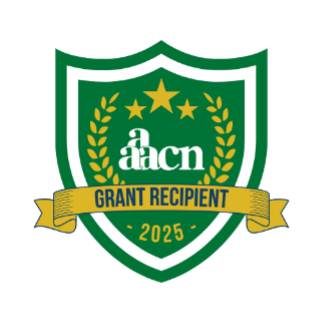Research is critical to the achievement of AAACN’s mission and vision. Goal five of our strategic plan is to build the infrastructure for AAACN to design, develop, and disseminate research.
The committee will be responsible for the development of research culture, oversight of the establishment of the research priorities, research awards and grants, and building research partnerships. The Research Committee is led by AAACN’s Nurse Scientist, Margo Halm, PhD, RN, NEA-BC
Research Committee
 |
Chair: |
 |
Co-Chair: |
 |
Angela Appiah, PhD, DPN, MPH, RN, COA, FAACM |
 |
Debbie Burger, PhD, RN |
 |
Elizabeth Fritz, PhD, RN, NPDA-BC, EBP-C |
 |
Jene Hurlbut, RN, MSN, MS, PhD, CNE |
 |
Chrystal Lewis, PhD, RN |
 |
Kathy Mertens, DNP, MN, MPH, RN |
 |
Donnya Mogensen, PhD, RN, NPD-BC, ACM |
 |
Edtrina Moss, PhD, RN, AMB-BC, NE-BC, CLSSGB |
 |
Jessica Varghese, PhD, RN |
 |
Ad-Hoc Member: Na Lim Heo, MDiv, MSN, RN |
 |
Board Liaison:
Andrea Petrovanie-Green, MSN, RN, AMB-BC |
Grants
2025 Grant Recipients
Kristin Sandau, PhD, RN
University of Minnesota School of Nursing


Title of Study: Person-Centered Priorities to Support Coping and Wellbeing with Heart Disease
Funding Level: $10,000
Ambulatory Care Nursing Research Priorities: Person-Centered Care Specialty Population Health
Advances in nurse-led interventions are essential to equip persons living with heart disease (PwHD) and care partners (family or unpaid supporters) with positive coping strategies that support wellbeing. Historically, interventions have focused on assessing the medical condition of PwHD at an individual level. Emerging evidence supports identifying interventions identified as priorities of interest by those most directly affected – the PwHD – as well as care partners.
This observational, cross-sectional quantitative study of PwHD and their care partners will identify priorities for nurse-led, non-pharmacologic interventions for coping and wellbeing. We will describe stress, coping, and wellbeing of PwHD and care partners, along with their respective desired non-pharmacologic interventions to enhance wellbeing. Findings of this study will inform person-centered practice and future interventional studies.
Founded on a framework for person-centered care, this study aligns with the AAACN and American Heart Association priorities for partnership among the health care team, patient, and family member in care planning and the decision-making process, as well as stress and coping theory.
Using a quantitative, cross-sectional observational design, PwHD and care partners will be recruited from a national online heart disease support group. Participants who self-identify as PwHD or care partners will receive an electronic link to a survey set including: demographic items, an interest in interventions survey, and established measures for stress, coping, and wellbeing.
AAACN looks forward to learning the findings from this study. Dr. Sandau plans to submit abstracts to the AAACN Annual Conference and disseminate findings in manuscript(s) to peer-reviewed journals (i.e., Journal of Ambulatory Care Nursing, Journal of Cardiovascular Nursing).
Melissa Dibble, MSN, RN, NPD-BC – Ambulatory Nurse Educator
Katherine Hinderer, PhD, RN, CNE, NEA-BC – Senior Nurse Scientist
Mary Riordan, BSN, RN, NPD-BC – Simulation Team Lead
Connecticut Children’s Medical Center




Title: A Recipe for Success: Improving Pediatric Emergency Training in Ambulatory Settings
Funding Level: $5000
Ambulatory Care Nursing Research Priorities: Workforce Development
Leadership: Interprofessional communication
Specialty Population Health: Acute conditions & pediatrics
The team identified a gap in knowledge, skill, and preparedness related to ambulatory pediatric emergency response through an organizational needs assessment and leadership discussions. Evidence supports that routine in situ simulations with a champion model can reduce skill decay and improve pediatric ambulatory emergency response in geographically diverse ambulatory clinics.
Guided by the Iowa Model of Evidence-Based Practice, the purpose of this initiative is to evaluate if implementation of an ambulatory pediatric emergency champion education program with evidence-based simulation toolkits improves clinical team members’ knowledge, confidence, and preparation for pediatric emergencies.
Clinic-based champions will be educated to lead in situ pediatric emergency simulations using a “recipe” based toolkit. Champions will complete a pre- and post-training Simulation Educator Needs Assessment Tool (SENAT), as well as the Facilitator Competency Rubric (FCR) and Simulation Effectiveness Tool-Modified (SET-M) post-training. The number and role of trained champions, participants, and latent threats will be tracked. Comparison of pre- and post-SENAT scores will explore educator needs and growth, the FCR will assess champion competency, and the SET-M will assess champion and participant confidence, knowledge, and preparation.
AAACN looks forward to the findings from this initiative. These EBP investigators plan to disseminate their findings in nursing grand rounds and submit abstracts for an oral or poster presentation at the AAACN Annual Conference and disseminate findings in a peer-reviewed journal – preferably the Journal of Ambulatory Care Nursing or the Journal for Nurses in Professional Development.
Amy Selimos, MSN, RN, PCNS-BC – Clinical Practice Specialist
Rebecca Newman, MS, RN, CPN – Clinical Practice Specialist
Children’s Hospital of Colorado
.jpg)


Title: Tools for Needle Procedures in Pediatric Ambulatory Clinics
Funding Level: $5000
Ambulatory Care Nursing Research Priorities: Specialty Population Health: Pediatrics
Practicing needle pain mitigation strategies, including non-pharmacological approaches, are crucial to reduce trauma caused by needle procedures. Despite their effectiveness, these strategies are not widely offered in our organization. Literature supports the notion that untreated needle pain can have long-term impacts on children's psychological well-being.
Leveraging the Iowa Model of Evidence-Based Practice, the purpose of this EBP initiative is to increase the prevalence of non-pharmacological interventions for needle procedures by 2026. Literature supports developmentally appropriate preparation, age-appropriate distraction, topical numbing agents, and comfort positioning as effective techniques in reducing pain and distress for children undergoing needle-related procedures. Additionally, benchmarking collected from other Children’s Hospitals showed reductions in pain reduction and increased patient satisfaction.
Following a successful pilot, a multimodal approach will be adopted for patients experiencing needle procedures in ambulatory settings. This approach includes increasing the usage of Buzzy© (with and without ice), distraction tools, child life, and comfort positions. Implementation will require purchasing Buzzy© devices, distraction tools, and training staff. Effectiveness of the initiative will be evaluated with statistical analysis of compliance rates and staff surveys.
AAACN looks forward to the findings from this initiative. Amy and Rebecca have a robust dissemination plan including hospital-wide Magnet grand rounds, national pediatric and nursing healthcare conferences, and a publication submitted to a peer-reviewed journal.
Evidence-based Practice
Research
- De-Implementation Survey
- Current Studies
- Research Consultation Service
- New to Research – More Information Coming Soon
- AAACN Conference – Dissemination Session
- Rapid-Fire Dissemination Tips for Success
- Examples of Abstracts
- National Ambulatory Nursing Research Priorities
- Ambulatory NSIs
- Care Coordination
- Leadership
- Medication Management
- Patient-centered Care
- Specialty/Population Health
- Telehealth
- Workforce Development
- Informatics
- Patient Wellness and Prevention
Process to Request Approval for a Research Study
Ambulatory Nursing Research Request Policy
Purpose:
To outline the process for researchers to request recruiting AAACN members to participate in a formal IRB-approved research study.
Process:
1. The Principal Investigator will send the following documents for review to AAACN’s nurse Scientist, Dr. Margo Halm at nursescientist@aaacn.org:
- Research proposal
- Any survey instruments to be distributed
- IRB approval
2. Dr. Halm and designated members of the AAACN Research Committee will review these documents to ensure the study has scientific merit for the ambulatory care nursing population and required IRB approvals are present.
3. Please do not hesitate to reach out to Dr. Halm if you have questions as you are preparing your research proposal. In addition, remember our Research Committee provides free research consultations to help our members jump start their research studies or EBP/QI initiatives. Please use this link to request a consult: Consultation Service
4. Once formal approval has been communicated, the Principal Investigator can post their survey in the Open Forum.
AAACN Member Publications
Research Committee Manuscripts:
- Ambulatory Nursing Research Priorities: A National Study
- EBP Capabilities and Research Competencies of Ambulatory Care Nurses
- Exploring Trends in the Ambulatory Nursing Practice Environment and Nurses’ Career Intentions: 2021 to 2023
- The Landscape of Amb Care Nursing Research: A Scoping Review
- Ambulatory Care Nurse-Sensitive Indicators: Scoping Review
Clinical Inquiry SIG
More information coming soon.
